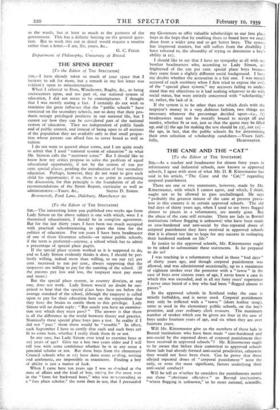THE SPENS REPORT
[To the Editor of THE SPECTATOR] SIR,—I have already taken so much of your space that I hesitate to ask for more, but a remark in my last letter was evident:y open to misconstruction.
When I referred to Eton, Winchester, Rugby, &c., as being excrescences upon, and not part of, our national system of education, I did not mean to be contemptuous. I thought that I was merely stating a fact. I certainly do not wish to minimise the great influence that the "public schools" have exercised on the secondary schools, nor to deny that their pro- ducts occupy privileged positions in our national life, but I cannot see how they can be considered part of the national system of education. They are independent of public funds and of public control, and instead of being open to all sections of the population they are available only to that small propor- tion whose parents can afford fees to cover board as well as tuition.
I do not want to quarrel about terms, and I am quite ready to admit that I used "national system of education" in what Mr. Stinton calls the "narrower sense." But I should like to know how my critics propose to solve the problem of equal educational opportunity, if not by the system of lao per cent, special places, pending the introduction of free secondary education. Perhaps, however, they do not want to give each child his opportunity; if so, there is no point in continuing the discussion, for that principle is the foundation of all the recommendations of the Spens Report, curricular as well as














































 Previous page
Previous page